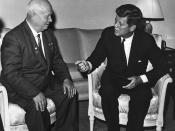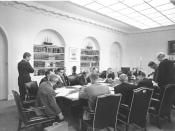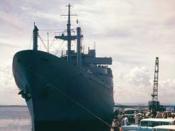"Now, as to Cuba - there's a place that could really lead to some unexpected consequences." (Nikita Khrushchev). Through this statement Khrushchev is expressing his anger towards the United States and that the United States is putting him in the position to use nuclear arms. The Cuban missile crisis can be considered one of the most controversial events in the greater part of the 20th century. It can be blamed on both the United States and the Soviet Union but when in retrospect the United States had really brought it on by their actions in the Cold War.
Following the surrender of Nazi Germany in May 1945 near the close of World War II, the uneasy wartime alliance between the United States and Great Britain on the one hand and the Soviet Union on the other began to unravel. The Cold Wars origin began in 1946 Sir Winston Churchill gave an address on foreign affairs at Westminster College in Fulton, Mo.
In it he uttered this ominous sentence: "From Stettin in the Baltic to Trieste in the Adriatic, an iron curtain has descended across the Continent of Europe." These words marked the beginning of the Cold War. American financier Bernard Baruch in a congressional debate first used the term again in 1947, and it may be defined as a condition of competition, tension, and conflict short of actual war between the Soviet Union and the United States.
The Cold War was a period of East-West competition, tension, and conflict short of full-scale war. It had of attempts to start or prevent revolution in smaller nations and several less-than-total confrontations between the superpowers such as the Berlin Blockade of 1948-49 and the Cuban missile crisis of 1962. In the beginning United States policy was one of "containment," first stated by diplomat...


